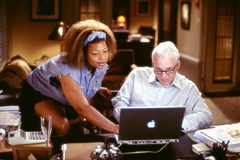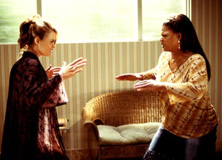|
Newest Reviews:
New Movies -
The Tunnel
V/H/S
The Tall Man
Mama Africa
Detention
Brake
Ted
Tomboy
Brownian Movement
Last Ride
[Rec]³: Genesis
Hara-Kiri: Death of a Samurai
Indie Game: The Movie
Abraham Lincoln: Vampire Hunter
Old Movies -
Touki Bouki: The Journey of the Hyena
Drums Along the Mohawk
The Chase
The Heiress
Show
People
The Strange Affair of Uncle Harry
Pitfall
Driftwood
Miracle Mile
The Great Flamarion
Dark Habits
Archives -
Recap: 2000,
2001, 2002,
2003, 2004
, 2005, 2006,
2007 , 2008
, 2009 ,
2010 , 2011 ,
2012
All reviews alphabetically
All reviews by star rating
All reviews by release year
Masterpieces
Screening Log
Links
FAQ
E-mail me
HOME
| |
Bringing Down the House (Adam Shankman, 2003)
 The characters in Adam Shankman’s sometimes questionable Bringing
Down the House spend so much time marveling at nonchalant displays of
“cool”, that it’s bound to make most audience members feel like a stick in
the mud, even if it’s not that hip itself. The film, which motors along
powered by an extremely thin Internet-fueled case of mistaken identity, wastes more time featuring
characters that assert their cool than it does having them demonstrate it to be
sure, but since the movie takes place in such a wildly exaggerated version of
Los Angeles, that hardly matters. It almost seems churlish in light of its
considerable good cheer to complain that the script only seems politically
correct because it inflates the racist tendencies of its cast of characters or
to whine that a supposedly cuddly scene in which Queen Latifah’s ex-con
Charlene teaches an eight-year-old boy to read using a magazine from his
father’s porn collection is a bit morally disturbing. Combining equal parts
from co-star Steve Martin’ zany vehicle Bowfinger and Warren Beatty’s
racially tinged political satire Bulworth, the movie offers a messy stew
that’s inferior to either, even as charisma ensures it comes across better than most recent
big-budget comedies.
The characters in Adam Shankman’s sometimes questionable Bringing
Down the House spend so much time marveling at nonchalant displays of
“cool”, that it’s bound to make most audience members feel like a stick in
the mud, even if it’s not that hip itself. The film, which motors along
powered by an extremely thin Internet-fueled case of mistaken identity, wastes more time featuring
characters that assert their cool than it does having them demonstrate it to be
sure, but since the movie takes place in such a wildly exaggerated version of
Los Angeles, that hardly matters. It almost seems churlish in light of its
considerable good cheer to complain that the script only seems politically
correct because it inflates the racist tendencies of its cast of characters or
to whine that a supposedly cuddly scene in which Queen Latifah’s ex-con
Charlene teaches an eight-year-old boy to read using a magazine from his
father’s porn collection is a bit morally disturbing. Combining equal parts
from co-star Steve Martin’ zany vehicle Bowfinger and Warren Beatty’s
racially tinged political satire Bulworth, the movie offers a messy stew
that’s inferior to either, even as charisma ensures it comes across better than most recent
big-budget comedies.
 Though House is
poorly directed (a disappointment after Shankman’s decent work in A
Walk to Remember), it succeeds more than it fails thanks to a collection of
superb comic performances. The central oddball comic pairing generates as many
laughs as one might suspect. Queen Latifah, hot off the success of her
Oscar-nominated role in Chicago (which
seems to be justified mostly because the Academy failed to recognize her work in
Living Out Loud) is much better here, exhibiting intelligent
humility at every opportunity by allowing the joke to be on her. Martin, her
co-star, is given fewer opportunities than usual to demonstrate his considerable
skills as a physical comedian, but when he does, he proves himself a better
talent than any of his contemporaries. Supporting turns from such unlikely
actors such as a scene-stealing Joan Plowright, Eugene Levy, and Betty White are
equally fine. Many of the best gags here are throwaway ones, delivered with an
offhandedness that makes them work, but even the large set pieces, most notably
an extended Tae-Bo battle, inspire some chuckles. The film only truly stumbles
as it enters into its plot-heavy third act, which wastes a lot of energy, but
still can’t manage to satisfy the audience’s desire to see Latifah and
Martin fall in love.
Though House is
poorly directed (a disappointment after Shankman’s decent work in A
Walk to Remember), it succeeds more than it fails thanks to a collection of
superb comic performances. The central oddball comic pairing generates as many
laughs as one might suspect. Queen Latifah, hot off the success of her
Oscar-nominated role in Chicago (which
seems to be justified mostly because the Academy failed to recognize her work in
Living Out Loud) is much better here, exhibiting intelligent
humility at every opportunity by allowing the joke to be on her. Martin, her
co-star, is given fewer opportunities than usual to demonstrate his considerable
skills as a physical comedian, but when he does, he proves himself a better
talent than any of his contemporaries. Supporting turns from such unlikely
actors such as a scene-stealing Joan Plowright, Eugene Levy, and Betty White are
equally fine. Many of the best gags here are throwaway ones, delivered with an
offhandedness that makes them work, but even the large set pieces, most notably
an extended Tae-Bo battle, inspire some chuckles. The film only truly stumbles
as it enters into its plot-heavy third act, which wastes a lot of energy, but
still can’t manage to satisfy the audience’s desire to see Latifah and
Martin fall in love.
* * *
03-07-03
Jeremy Heilman
|